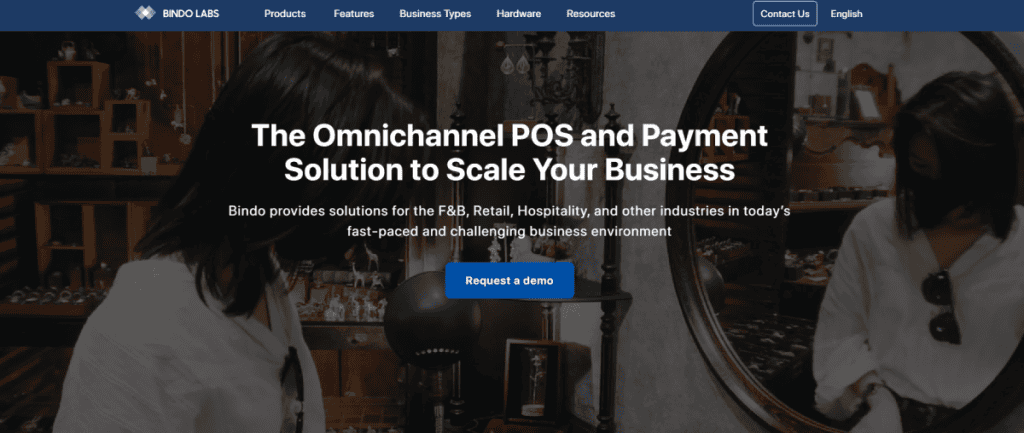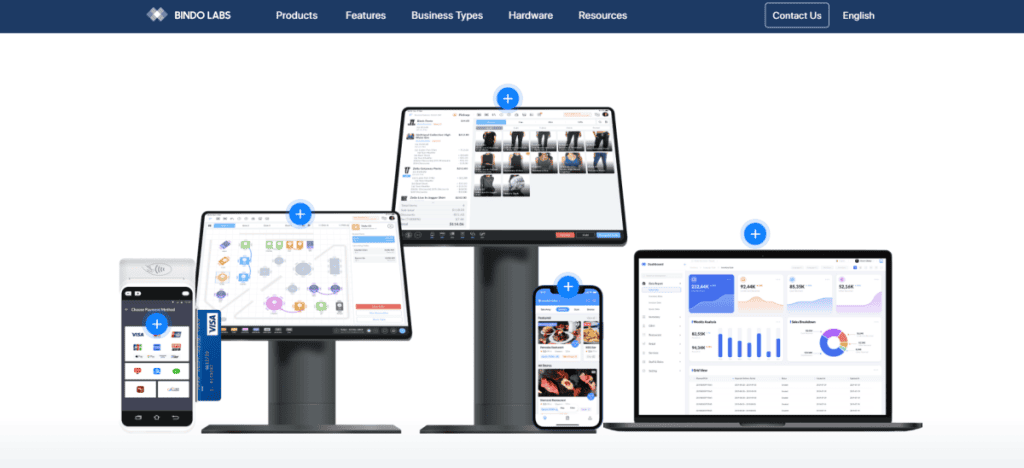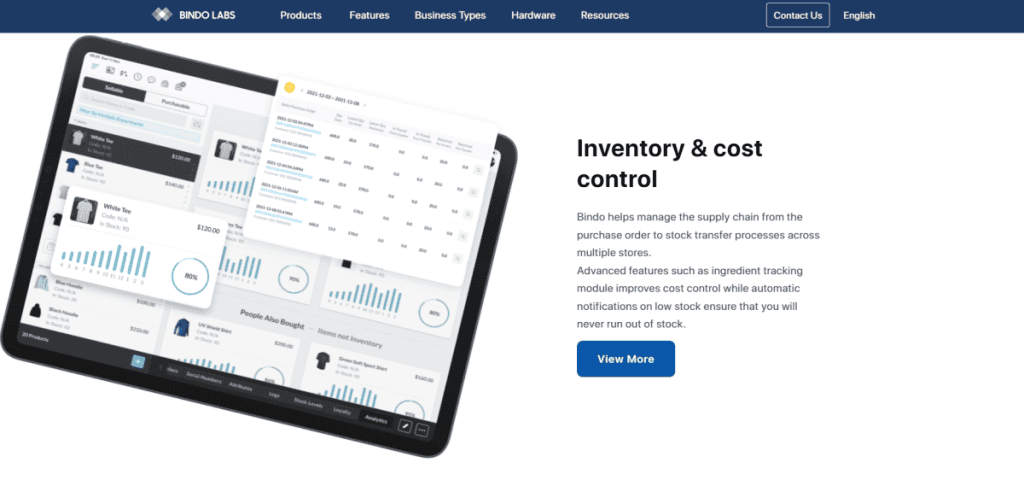
Bindo Review
- 07th Aug, 2024
- | By Linda Mae
- | Reviews
Bindo POS is an all-comprehensive cloud-hosted POS system specifically created to simplify operations for retail and restaurant establishments. Its standout features include a wide range of functions like strong inventory management, CRM integration, and flexible payment processing options. This system is well-known for its flexibility, as it caters to both in-store and online sales with a user-friendly iPad interface. Bindo’s goal is to streamline business operations and improve customer experiences through the seamless integration of multiple business functions on one platform. Let’s delve deeper into the Bindo Review.
Company Background | Bindo Review
In 2010, Jason Ngan, JoMing Au, and Brad Lauster established Bindo with the goal of creating a system that connects traditional retail stores with online shopping. Bindo was first introduced in Manhattan and rapidly became popular due to its unique strategy for local trade, allowing small businesses to challenge bigger retailers through a hyperlocal marketplace. This platform links nearby shops with customers, enabling quick deliveries and improving shopping by managing inventory in real-time.
Over the years, Bindo has expanded its operations globally, with headquarters in New York and additional offices in Hong Kong, Mainland China, and partnerships across Southeast Asia. The company has continuously evolved, integrating advanced features such as NFC payments, EMV chip support, and a robust API for custom integrations. Despite its growth, Bindo remains committed to empowering small and medium-sized enterprises by providing tools that enhance operational efficiency and customer engagement.
Features and Functionality
Bindo POS provides a wide range of features aimed at improving both business operations and customer experiences. Here is a summary of its main features in different areas.
Payment Processing
Bindo POS effortlessly connects with various payment processors, enabling businesses to take advantage of various payment methods such as credit and debit cards, as well as mobile payments through Apple Pay and Google Pay. This flexibility ensures that businesses can cater to diverse customer preferences. Security is a top priority, with military-grade encryption protecting all transactions. Additionally, Bindo supports EMV chip and contactless NFC payments, providing both security and convenience.
Inventory and Order Management
Bindo POS excels in inventory management, offering the capability to store data for up to 10 million products. This system has advanced capabilities such as alerting for low stock and generating purchase orders, aiding businesses in keeping their stock levels optimal. Smart re-arrangement recommendations enhance inventory control, guaranteeing constant availability of in-demand products. For restaurants, Bindo includes ingredient tracking, which simplifies kitchen operations. The multi-location management feature allows businesses to manage inventory across multiple stores seamlessly, facilitating easy transfers and consolidated tracking.
Customer Relationship Management (CRM)
Bindo’s CRM capabilities enable businesses to create detailed customer profiles and track purchase histories. This data can be leveraged to design personalized marketing campaigns, enhancing customer engagement and loyalty. Businesses can utilize the integrated loyalty programs and strong promotion tools to provide tailored rewards, discounts, and special promotions, leading to increased customer satisfaction and repeat business.
Employee Management
The employee management tools in Bindo POS include PIN-based time clocks, enabling employees to clock in and out digitally. While the system offers basic performance reporting, it lacks advanced payroll and scheduling features, which might be a limitation for larger businesses requiring comprehensive employee management solutions.
Reporting and Analytics
Bindo provides a variety of reporting and analytics tools that deliver insights into sales, inventory, and employee performance. Businesses can generate sales summaries, track inventory levels, and monitor employee performance metrics. The system provides the option to customize reports and visualize data, enabling businesses to adapt analytics to their unique requirements. These characteristics assist in forming well-informed decisions using current data.
Bindo POS is known for its wide range of features and strong capabilities, making it a valuable asset for businesses aiming to improve efficiency and customer satisfaction.
Hardware Options
Bindo POS provides a variety of hardware options to suit various business requirements. Businesses can personalize their POS setup to improve efficiency and customer service by using a variety of devices and third-party accessories that are compatible.
Compatibility with Existing iPads: One of the primary advantages of Bindo POS is its compatibility with existing iPads. This feature allows businesses to leverage their current hardware, reducing the need for significant additional investments. Installing the Bindo POS app on an iPad can quickly turn it into a robust point-of-sale terminal. This compatibility guarantees a smooth and cost-efficient integration with current business operations.
Support for Third-Party Hardware: Bindo POS supports a wide range of third-party hardware, enhancing its functionality and flexibility. Businesses can integrate barcode scanners, receipt printers, and cash drawers from various manufacturers, including well-known brands like Pax and Landi. This assistance enables companies to select the hardware that aligns with their operational requirements and financial constraints. Barcode scanners make the checkout process more efficient by rapidly and precisely scanning product details. Receipt printers ensure customers receive printed records of their transactions, while cash drawers provide secure storage for cash transactions.
Mobile POS Solutions and Self-Service Kiosks: Aside from conventional POS systems, Bindo provides modern business needs with mobile POS solutions and self-service kiosks. Mobile POS solutions enable businesses to take the checkout process directly to the customer, whether at tableside in a restaurant or within a retail store. This mobility enhances customer service and speeds up transactions, leading to higher customer satisfaction. Bindo POS supports self-service kiosks as an additional innovative feature. These kiosks enable customers to place orders and process payments independently without the need for staff assistance.This option is particularly beneficial in high-traffic environments like quick-service restaurants or retail stores, reducing wait times and improving overall efficiency.
Bindo POS is a versatile option for businesses looking to improve their operational efficiency and customer experience, thanks to its wide range of hardware compatibility and support for mobile and self-service solutions.
Pricing
When it comes to pricing, Bindo POS is difficult for potential customers because it does not provide clear pricing information. Unlike many other POS systems that offer clear pricing structures on their websites, Bindo requires businesses to contact their sales team for a custom quote. This approach can be frustrating for businesses looking to quickly compare costs and determine the best fit for their budget.
Lack of Transparent Pricing Information: Bindo does not publicly disclose its pricing details on its website. This absence of transparent pricing means that potential customers cannot readily see what they might expect to pay for the service. Businesses must go through the process of contacting the sales team, which can be time-consuming and may deter some potential clients who prefer upfront clarity on costs.
Custom Quotes from the Sales Team: Businesses need to contact Bindo’s sales team to get pricing information. The sales team offers personalized quotes depending on the specific requirements and scale of the company. Even though this method enables Bindo to customize its pricing to suit specific business needs, it also results in significant price discrepancies among customers.
Availability of a 14-Day Free Trial: Despite the lack of transparent pricing, Bindo does offer a 14-day free trial. This trial period allows businesses to explore the system’s features and functionalities before making a financial commitment. The trial allows for evaluation of whether Bindo POS meets their operational requirements and warrants the investment. This can be especially beneficial for companies that are uncertain about switching to a different POS system.
In summary, while Bindo POS offers a flexible and potentially cost-effective solution tailored to individual business needs, the lack of transparent pricing information can be a drawback. However, the availability of a 14-day free trial provides a risk-free way for businesses to evaluate the system’s suitability for their operations.
Contract Terms
Businesses must grasp the contract terms of Bindo POS to make an informed decision about adopting it. Bindo provides options in its agreements, however, it is important to understand certain crucial factors such as contract demands, length, cancellation rules, and extension conditions.
Overview of Contract Requirements: Bindo POS typically requires businesses to enter into a formal agreement outlining the scope of services, pricing, and specific requirements tailored to the business’s needs. These contracts are designed to ensure that both parties clearly understand their obligations and the services to be provided. The agreements often include details on the hardware and software components, training, and support services.
Duration of Contracts: The duration of contracts with Bindo POS can vary depending on the specific agreement reached with the sales team. Businesses may have the option to choose between short-term and long-term contracts. Short-term agreements offer businesses flexibility if they are unsure of their long-term requirements or wish to assess the system before fully committing. Long-term contracts, on the other hand, may offer better pricing and stability, making them suitable for businesses looking for a long-term solution.
Termination Policies: Termination policies are an essential part of any contract, and Bindo POS contracts typically include clauses detailing the conditions under which either party can terminate the agreement. These factors could consist of not upholding the contract, not achieving agreed upon performance measures, or other important problems. Businesses must carefully examine these policies in order to comprehend the potential consequences or charges connected to ending the agreement prematurely. Generally, proper notice must be given, and specific procedures followed to terminate the contract without incurring additional costs.
Renewal Terms and Conditions: Renewal terms for Bindo POS contracts are usually outlined in the original agreement. Contracts may automatically renew at the end of the term unless either party gives notice of their intent not to renew. The renewal terms can also include adjustments in pricing or service levels, reflecting changes in the business environment or the specific needs of the business. It is advisable for businesses to review these terms closely and discuss any desired changes with Bindo’s sales team before the renewal date.
Ease of Use
Bindo POS is designed with user-friendliness in mind, offering an intuitive interface that simplifies daily operations for businesses. This ease of use extends from its initial setup to everyday navigation, making it accessible even for those who may not be tech-savvy.
User-Friendly Interface and Navigation: The Bindo POS interface is clean and straightforward, allowing users to easily navigate through its various functions. The system is designed to minimize the learning curve, enabling staff to quickly become proficient in its use. The main dashboard provides clear access to essential functions such as sales, inventory management, and customer data, ensuring that users can perform tasks efficiently without having to wade through complex menus.
Customizable POS Interface for Different Industries: One of the standout features of Bindo POS is its ability to customize the interface to suit different industries. Whether you’re running a retail store, a restaurant, or a service-based business, Bindo allows you to tailor the POS system to meet your specific operational needs. This customization includes adjusting the layout, modifying transaction workflows, and integrating industry-specific tools such as table management for restaurants or appointment scheduling for salons. This flexibility ensures that businesses can optimize their use of the POS system to enhance their operational efficiency.
Initial Setup and Onboarding Experience: The initial setup of Bindo POS is designed to be as seamless as possible. Once a business decides to implement Bindo, the setup process involves installing the software on compatible devices, such as iPads, and configuring it to match the business’s specific needs. Bindo’s customer support team is available to assist with this setup, providing guidance and support to ensure everything is configured correctly. Additionally, the onboarding experience includes training sessions for staff to familiarize them with the system. This comprehensive support helps businesses get up and running quickly, reducing downtime and ensuring a smooth transition to the new POS system.
Customer Support
Bindo POS offers several customer support options to help businesses resolve issues and make the most of their system. However, some limitations in their support channels may affect the overall user experience.
Email and Phone Support Availability: Bindo provides email and phone support to assist customers with any questions or technical issues they might encounter. Email support allows users to detail their problems and receive comprehensive responses, often within a reasonable timeframe. Phone support is available during business hours, offering direct and immediate assistance. This is particularly beneficial for urgent issues that require quick resolutions. The availability of these support channels ensures that users have access to help when they need it, contributing to a more seamless user experience.
Removal of Live Chat Option: One significant drawback in Bindo’s customer support is the removal of the live chat option. Live chat previously offered real-time assistance, making it a convenient and efficient way for users to get help. The absence of this feature means users now have to rely solely on email and phone support, which may not always provide the immediacy that live chat did. This change can be particularly inconvenient for businesses that operate outside of regular business hours or those that need instant support.
Knowledge Base and Tutorial Resources: To compensate for the removal of live chat, Bindo has a comprehensive knowledge base and a range of tutorial resources. The knowledge base includes detailed articles, FAQs, and step-by-step guides that cover various aspects of the POS system. These tools aim to assist individuals in resolving typical problems on their own and mastering the system’s functions efficiently. You can access tutorial videos for visual instructions on how to set up and utilize various features of Bindo POS. This self-help approach empowers users to resolve issues on their own and gain a deeper understanding of the system.
Security
Security is a critical aspect of any point-of-sale (POS) system, as it handles sensitive customer information and financial transactions. Unfortunately, Bindo POS has raised some concerns due to the lack of detailed security information available to its users.
Concerns Over Lack of Detailed Security Information: One of the primary issues with Bindo POS is the insufficient transparency regarding its security measures. Although the system provides military-level encryption for transaction security, there is little detail available regarding other security measures like protocols, certifications, or adherence to industry standards like PCI DSS. The absence of specific information may cause potential users to feel uneasy, as they cannot thoroughly evaluate the system’s ability to safeguard sensitive data. Businesses need comprehensive security details to ensure their POS system will safeguard against data breaches and cyber threats.
Importance of Security in POS Systems: The importance of security in POS systems cannot be overstated. POS systems handle a significant volume of transactions and store sensitive information such as credit card details and customer data. A breach in security can result in significant financial losses, harm to reputation, and legal consequences. Hence, it is crucial for a POS system to utilize strong encryption and implement thorough security measures.
Secure POS systems should include features such as:
Data Encryption: Ensuring that all transaction data is encrypted both in transit and at rest.
Access Controls: Implementing strict access controls to limit who can access sensitive information and system settings.
Regular Security Updates: Providing regular software updates to address vulnerabilities and enhance security features.
Compliance with Standards: Adhering to industry standards like PCI DSS to ensure comprehensive security practices.
Businesses must be confident that their POS system can protect against data theft and cyber attacks. As such, they typically prefer systems that provide clear, detailed information about their security measures and certifications. For Bindo POS to reassure its users, it would benefit from increased transparency and detailed disclosure of its security protocols and compliance certifications.
Overall, Bindo POS states that it utilizes advanced encryption methods to secure transactions, but the absence of specific security details could worry prospective customers. Due to the crucial significance of security in POS systems, Bindo should strive to offer more detailed information to instill confidence and reassure its users about the protection of their data.
Pros and Cons
Pros
Versatile and feature-rich: Bindo POS offers a wide range of features that cater to different business needs, making it a versatile solution for various industries.
Comprehensive CRM and inventory management: The system includes robust customer relationship management and inventory management capabilities, allowing businesses to efficiently track customer interactions and manage stock levels.
User-friendly interface: Bindo POS is designed with an intuitive and easy-to-navigate interface, minimizing the learning curve for new users and enhancing overall user experience.
Cons
Lack of transparent pricing: Bindo POS does not provide clear pricing information upfront, requiring potential customers to contact the sales team for custom quotes. This can be frustrating for businesses looking for straightforward pricing details.
Limited employee management features: The system lacks advanced employee management tools, such as comprehensive payroll and scheduling functionalities, which may be necessary for larger businesses.
Insufficient security information: While Bindo POS claims to use high-level encryption, there is a lack of detailed information about other security measures and protocols, potentially causing concerns for businesses prioritizing data security.
Alternatives to Bindo POS
For businesses seeking alternatives to Bindo POS, several other options offer robust features and capabilities.
Square POS
Overview and Key Features: Square POS is a popular choice for small to medium-sized businesses due to its comprehensive features and ease of use. It offers integrated payment processing, inventory management, and customer relationship management. Square POS also supports various payment methods, including credit cards, mobile payments, and contactless transactions. The system provides valuable reporting and analytics tools, and its hardware options include mobile card readers and full-service countertop registers.
Clover POS
Overview and Key Features: Clover POS is known for its flexibility and extensive hardware options. Its selection includes various POS terminals, such as mobile options like Clover Go and full-service options like Clover Station. Noteworthy features comprise customizable software, strong inventory management, staff management, and customer loyalty programs. Clover POS also integrates with numerous third-party applications, enhancing its functionality and allowing businesses to tailor the system to their specific needs.
Shopify POS
Overview and Key Features: Shopify POS is ideal for businesses with a significant online presence. It integrates seamlessly with the Shopify e-commerce platform, enabling unified management of both online and offline sales. Important aspects include thorough inventory control, client information, and extensive reporting. Shopify POS provides support for multiple payment methods and offers a range of adaptable hardware choices, such as card readers and retail kits. Its extensive app ecosystem allows businesses to add functionalities tailored to their specific requirements.
These alternatives provide diverse options, each with unique strengths, making them suitable for different business needs and environments.
Conclusion
Bindo POS provides a flexible and full-featured system with extensive CRM and inventory control, along with a user-friendly interface. Nevertheless, it comes with drawbacks such as unclear pricing, minimal employee management options, and inadequate security information. Potential users need to carefully consider these advantages and disadvantages before making a decision.



